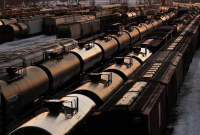Support strong Canadian climate journalism for 2025
A program that allows the Alberta government to impose production caps on oil companies is being extended by a year as delays in building new market-opening pipelines persist.
"I am the very last person who wants to see curtailment continue," Energy Minister Sonya Savage said Tuesday.
"But while extending curtailment is far from ideal, under the current context it is necessary."
The policy was brought in by the former NDP government as the price gap between western Canadian heavy crude and U.S. light oil ballooned to more than US$40 a barrel in late 2018, ravaging companies' bottom lines and provincial revenues.
The province and industry players have said the root of the problem is an inability to export Canadian oil as regulatory and legal challenges bog down new pipeline projects.
Curtailment was supposed to be in place until the end of this year. But the province decided to extend it by a year in large part because Enbridge's Line 3 Replacement project to the U.S. Midwest, which would add 370,000 barrels of daily export capacity, is being held up by permitting issues and legal wrangling in Minnesota.
"This, on top of the untimely deaths of Northern Gateway and Energy East, means that Alberta remains at risk of producing more crude oil than we are able to move," she said, pointing to what she called Prime Minister Justin Trudeau's "political failure" on the energy file.
Savage said without the production limits, there would be 150,000 more barrels produced daily than could be exported.
The province has been gradually easing its limits since imposing an initial 3.56 million barrel a day cap in January. September's levels are set at 3.76 million barrels a day, with October's set to rise to 3.79 million barrels. Before curtailment, companies in the province could produce more than four million barrels a day during the strongest months.
Savage also said Tuesday that in order to reduce the impact on smaller players, the limits will apply to companies that produce more than 20,000 barrels a day, rather than 10,000 barrels. That means instead of 29 of the province's more than 300 operators being affected, it will be 16.
The province is also giving the industry a month's more notice when a change in production limits is coming so it can better plan investment.
The revamped curtailment program is to take effect in October.
Savage said she hopes the limits won't have to still be in place until the end of 2020, but extending the regulation allows for flexibility.
Opposition NDP energy critic Irfan Sabir said the United Conservative Party's decision to cancel contracts to ship crude by rail has forced the government to extend curtailment.
Former premier Rachel Notley had announced plans to lease 4,400 rail cars to move up to 120,000 barrels a day, but the UCP has since put those contracts up for sale.
"I am calling on Premier (Jason) Kenney to immediately reinstate the oil-by-rail contracts and get our product to market," Sabir said in a release.
"This (curtailment) decision could have been avoided if the UCP set their ideology aside and did what was right for the people of Alberta."





Comments
Wait a minute. Kenney campaigned on ending the curtailment because it was such an evil NDP policy. Now, it is necessary?